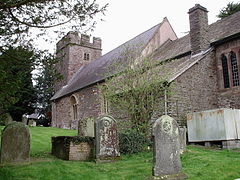Llangybi, Monmouthshire
| Llangybi | |
|---|---|
 St. Cybi's Church |
|
| Llangybi shown within Monmouthshire | |
| Population | 890 (2011) |
| OS grid reference | ST372967 |
| Principal area | |
| Ceremonial county | |
| Country | Wales |
| Sovereign state | United Kingdom |
| Post town | USK |
| Postcode district | NP15 |
| Dialling code | 01633 |
| Police | Gwent |
| Fire | South Wales |
| Ambulance | Welsh |
| EU Parliament | Wales |
| UK Parliament | |
Llangybi (also spelled Llangibby) is a community and village in Monmouthshire, in southeast Wales, United Kingdom. It is located 3 miles (4.8 km) south of the town of Usk and 5 miles (8 km) north of Caerleon, in the valley of the River Usk.
The village was traditionally founded by the 6th-century Cornish Saint Cybi. According to legend, he is supposed to have crossed the Bristol Channel with ten followers. The life of St. Cybi, written much later and therefore including some questionable material, records that the local king, Edelig son of Glywys, threatened to evict them from his land, but as he approached them he fell from his horse, which died, and he and his men became blind. Edelig then prostrated himself and gave his body and soul to God, and he and his attendants were immediately cured and the horse restored to life. Edelig then, in thanks, gave Cybi land for two churches, including the one which became known as Llangybi, and another at an unspecified location (possibly Llandegveth, a neighbouring village) where he is reported to have left a handbell.
The existing church, dedicated to St. Cybi (or Cuby), has been described as "one of the most interesting in the Usk valley" and "a delight". The tower, nave and chancel all date from the 13th or 14th century, and the church has 17th-century internal fittings, including the pulpit, font, and monuments to the local Williams family. There are also wall paintings dating from the late medieval period and the 17th century. One which is of particular interest is a "Christ of the trades", or more correctly a Sunday Christ, of which there are very few in the UK. Outside is the site of a traditional well, also named for St. Cybi.
The church is in regular use and is now part of a benefice with Llanbadoc, Tredunnock and Coed-y-paen. There is a bell ringing club.
...
Wikipedia

